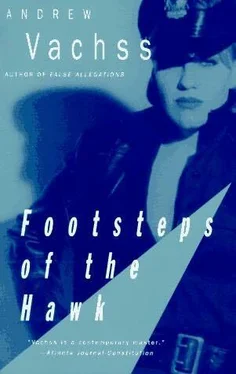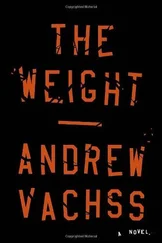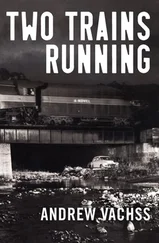Some of the playground names are still legend— Helicopter, Connie, The Goat— their feats magnified by time. I know a guy who claims he once saw The Goat soar above the rim, jam one down with his right hand, catch it coming out the bottom of the net with his left, and slam it home again with that hand before he touched down.
The city game is way past rough— anytime they call a foul, they call the paramedics too. Once I was watching a football game on cable— Australian Rules, the announcer said. None of the players wore helmets or pads, but they threw themselves at each other like they were armor–plated. An Aussie was in the same bar, and we struck up a conversation. He was in town to do a deal with someone— it was that kind of joint. He tried to explain the action to me, but I wasn't following all of it. I saw one player use a judo move to throw an opponent to the ground, then dive on him head–first. I could almost hear the ribs crack. "What do they have to do to have a foul called?" I asked the Aussie.
He thought about it for a moment, obviously puzzled. Then he said, "Well, if they were to use a weapon…"
That hour of the morning, the court was being used by stay–in–shape amateurs. The game was so weak there was no betting going on. I leaned my back against the chain–link fence, looking down Sixth Avenue, waiting for Hauser. I heard a double–honk of a horn, looked at the source and saw a window going down in an electric–blue Ford Explorer four–by. Hauser's face showed in the window. I walked over, got into the passenger seat. He hit the gas and lurched out into traffic.
"Very subtle ride you got here," I said.
"Yeah!" Hauser replied, taking it as a compliment. "And the boys really love it."
"Take the next right," I told him, then gave him directions to where Belinda would be waiting.
"Check this out," Hauser said, his face animated as he pushed the eject button on his radio. A cassette tape popped into view, still in the slot. I thought he was going to put in a new one, make me listen to some lame music, but he just left it there.
"What's it supposed to do?" I asked him.
Hauser grinned, pushed a button on the radio. No music came out. He waited a couple of seconds, then pushed another. "What's it supposed to do?" came out of the speakers. In my voice.
"The whole truck is wired," he said. "I've got other stuff too. Even a minicam in the back. I could sit back there for hours. I can see out, but nobody can see in. It's just perfect for surveillance."
"What if somebody wants to listen to the radio?" I asked him.
"As long as the tape cassette is in the slot, it works," Hauser said. "I can play the tapes too— all I have to do is push it in."
"This must have cost a fortune," I said.
"Not so much," he said, a slightly defensive tone in his voice.
"It's awesome," I assured him.
"It's great in bad weather too," he said, still not satisfied.
"I sure wish I had one," I said. That seemed to calm him down. Which was a good thing. I quickly discovered Hauser wasn't one of those guys who could talk and drive at the same time— he almost splattered a pedestrian because he was so busy talking. Apparently, he couldn't talk without making eye contact. I made up my mind to ride in the back seat on the way to Jersey.
Belinda was right in front of the precinct. She was wearing jeans tucked into mid–calf black boots, her upper body covered in a white turtleneck, a jacket over one shoulder. When we pulled up, I got out, opened the passenger door for her. She climbed inside, and I slid into the back seat.
"Belinda Roberts, J. P. Hauser," I said by way of introduction.
"I'm pleased to meet you," Belinda said.
"Same here," Hauser said, turning to face her, holding out his right hand for her to shake. Belinda started to reach for his hand, then gasped as Hauser just missed crunching a taxicab at the intersection.
"Take the Tunnel," I said to Hauser. "Then we want the Turnpike south."
In the Tunnel, Hauser and Belinda got to talking about courthouse personnel: judges, clerks, court officers, ADAs. "Moltino's a major asshole," Hauser said.
"Big–time," Belinda agreed.
I put my feet up on the big back seat, leaned back, closed my eyes.
My eyes flickered open as Hauser was pulling off to the side of the road. I could feel the trooper somewhere behind us. "Fuck!" Hauser said. "That's just what I need— another goddamn ticket."
I looked back over my shoulder out of the corner of my eye. The trooper was Central Casting: tall, square–jawed, his Mountie hat canted at just the right angle. He walked around to the driver's window— Hauser already had it down.
"Sir, you were clocked at— "
"It's my fault, officer," Belinda said, leaning across Hauser, arching her back so she could look up into the trooper's eyes. Or to show him how eager her breasts were to bust out of the white turtleneck.
"I'm on the job," she said. "Going down to the state prison to interview a witness." She pulled a thick leather wallet out of her jacket, handed it over.
The trooper flipped it open, saw the badge, gave Belinda a sharp look.
"Call it in," she said, flashing a dazzling smile. "It's not my boyfriend's badge, it's mine. I don't even have a boyfriend," she said in that pouty little–girl tone I'd heard her use before.
"May I see your license and registration, sir?" the trooper said to Hauser.
He took it all back to his cruiser. A few minutes passed. He walked back over. "Sir, you were clocked at seventy miles per hour. Since you have no prior record, it is our policy to issue a warning at this time. Please drive more carefully in the future."
"Thank you ,"Hauser said fervently.
The trooper leaned into the window a bit, handed Belinda's wallet back to her. Then he straightened up, threw a half–salute and went back to his cruiser.
As Hauser pulled away, Belinda snapped open her wallet. A white business card popped out. She put the card in another jacket pocket, cranked her seat way back so she was almost reclining, looking up at me.
"Nice work," I told her.
"Well, you can usually tin a Jersey cop," she said, smiling. "We'd do the same for them on a traffic thing."
"I don't think it was the badge that did it," I told her.
"What else could it be?" She smiled again, taking a deep breath.
We got off the Turnpike at Exit 8A. Belinda directed Hauser from there. I knew a faster way, but I didn't say anything.
You almost never see prisons in the middle of cities. Jails, maybe, but prisons, they always want them out in the sticks. But Trenton State Prison is so old that it was there first— they had to build the city around it. We turned off Federal Street into the visitors' parking lot. Hauser looked at the dark monster looming above us: endless stone walls aged into a single definitionless mass, a filthy gray–black slab. "It's right out of a movie," he said. "A fucking horror movie."
Belinda went up to the window first, leaned in to talk to the guard. When she motioned to us, Hauser and I went over too. We each showed ID— Hauser his press pass, me my phony bar card:
Juan Rodriguez, Abogado.
"I told them you were George's lawyer," Belinda whispered. "And that J.P. was covering the case. This way, we get a contact visit."
"What's that?" Hauser asked her.
"If you're not an attorney, or a cop, or whatever— if you're just family or friends— then the visit is over the phone. Not a telephone, just a receiver you pick up on one side of the glass. The guy you're visiting does the same. A contact visit is when you can touch— no barriers."
"Piersall. George Piersall," the speaker squawked.
"That's us," Belinda said, standing up to lead the way.
Читать дальше












